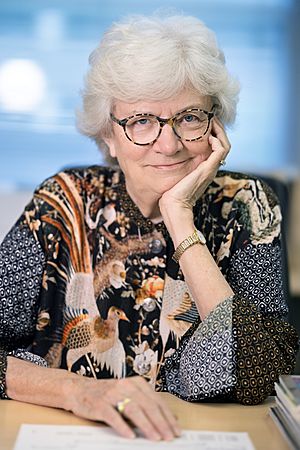Nancy Hopkins (scientist) facts for kids
Quick facts for kids
Nancy Hopkins
|
|
|---|---|
 |
|
| Born |
Nancy Doe
June 16, 1943 New York City, US
|
| Alma mater | Radcliffe College Harvard |
| Spouse(s) | Brooke Hopkins (1967-1973) J. Dinsmore Adams Jr. (2007) |
| Scientific career | |
| Fields | Biology |
| Institutions | MIT |
Nancy Hopkins (born June 16, 1943) is an American scientist who studies tiny living things, like genes and viruses. She is a professor of biology at the Massachusetts Institute of Technology (MIT). Nancy Hopkins is famous for her research on how zebrafish develop. She also worked on viruses and how genes work.
She is also well-known for her efforts to help women scientists get fair chances in universities. She is a member of important science groups like the National Academy of Sciences.
Contents
Early Life and Education
Nancy Doe Hopkins was born in 1943 in New York City. She loved learning about science from a young age.
She went to Radcliffe College and earned her first degree in 1964. Later, she got her PhD from Harvard University in 1971. At Harvard, she worked with Professor Mark Ptashne. They studied how a tiny virus called lambda controls its life cycle. They found special spots on DNA where the virus's control proteins attach.
After Harvard, she worked at the Cold Spring Harbor Laboratory. There, she studied how cells work. She made an interesting discovery: cells could fix their normal shape even after their center (nucleus) was taken out.
Research Career at MIT
Nancy Hopkins joined the MIT faculty in 1973. She started studying viruses that can cause cancer in mice. She found out which parts of these viruses cause different types of cancer. She also discovered important genetic elements called enhancers. These enhancers help control how genes are turned on or off.
In 1989, she took a break to work with Nobel Prize winner Christiane Nusslein-Volhard. After this, Hopkins changed her research focus. She started working with zebrafish to study how animals develop.
Zebrafish Development Research
With her team, Nancy Hopkins created a new way to study zebrafish genes. They used a method called "insertional mutagenesis." This method helps scientists find out what different genes do.
Using this technique, her lab did a big study. They found many genes that are vital for a fertilized zebrafish egg to grow into a swimming larva. They even found genes that can make fish more likely to get cancer. They also found genes that cause kidney problems in fish, similar to kidney diseases in humans.
Helping Women in Science
In the mid-1990s, Nancy Hopkins noticed that women scientists at MIT were not always treated fairly. In 1994, she and 15 other women professors wrote a letter to the Dean of Science. They shared their evidence about unfair treatment due to unconscious bias.
Because of their concerns, a committee was formed to look into the issue. Nancy Hopkins helped lead this committee. The committee included both men and women professors.
The MIT Study
In 1999, the committee published their findings. The report showed that women faculty faced inequalities. The president of MIT, Charles Vest, supported these findings. This report became very famous and led to a national discussion about fairness for women scientists.
Many people saw MIT's efforts as a great example of an institution checking itself. It also led nine major research universities, including MIT, to work together. This group, called "The MIT-9," continues to study and fix issues of gender fairness in science.
In 2020, Nancy Hopkins appeared in a film called "Picture a Scientist" at the Tribeca Film Festival. In the film, she talked about the important MIT study.
Speaking Up for Equality
In 2005, Nancy Hopkins made headlines during a meeting about women in science. The president of Harvard, Lawrence Summers, suggested that differences in natural ability might explain why fewer women were in top science and engineering jobs. Nancy Hopkins walked out of the talk to show her disagreement.
Her action became public and started a big national discussion. This discussion was about gender discrimination and academic freedom. It also played a part in Summers' decision to leave his position at Harvard.
Honors and Awards
Nancy Hopkins has received many awards for her important work:
- Fellow of the American Academy of Arts and Sciences
- Member of the Institute of Medicine of the National Academies
- Member of the National Academy of Sciences
- Margaret L. Kripke Legend Award (2012)
- Honorary doctorate from Trinity College Dublin (2014)
- Alice C. Evans Award, American Society for Microbiology (2015)
- Helen Dean King Award (2017)
Personal Life
Nancy Hopkins has been married to J. Dinsmore Adams Jr. since 2007.

